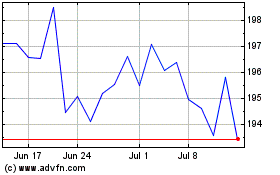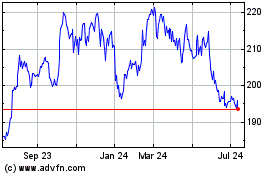UPDATE: CBOE Is In Talks With Other States On Move -CEO
September 30 2011 - 4:29PM
Dow Jones News
The parent of the Chicago Board Options Exchange has held talks
with a number of governors and state officials about a possible
move of its headquarters to another state after Illinois raised its
tax rate, providing another challenge to the city's status as the
self-styled "derivatives capital of the world."
January's tax increase is seen increasing CBOE Holdings Inc.'s
(CBOE) state tax bill by a quarter. Chicago-based CME Group Inc.
(CME), the world's largest futures exchange operator, is also
talking about relocating its headquarters.
"We've had a series of meetings with people in this state and
outside this state," said Bill Brodsky, chairman and chief
executive of CBOE, in an interview. "The bottom line is that we
don't want to leave Illinois, but the structure that exists as it
relates to exchanges is virtually punitive."
Chicago's derivatives exchanges form the nucleus of a broader
financial services sector that is also being hit by the tax rise,
said Brodsky. The trading business is estimated to employ around
120,000 people in the city, and has expanded to fill the gap left
by the decline of its manufacturing base.
Both exchange operators remain in talks with Illinois and city
officials, with discussions about relocating some functions seen by
observers as an effort to provide leverage in winning
concessions.
"Our goal is to find a way that will remove the punitive aspects
that will allow us not to move operations out," Brodsky said.
"Hopefully we will come to a solution, but if not we have many
other alternatives."
He declined to identify the states to which he is talking.
CME has held discussions with at least five states, with Florida
and Texas seen as frontrunners to lure its headquarters and
potentially several hundred staff, though its main trading floor
and many other functions would still remain in Chicago.
CME Executive Chairman Terry Duffy indicated this week that a
final decision was likely by early next year.
Brodsky said that Illinois' taxation framework sticks exchanges
with a high effective tax rate that is "discriminatory and
punitive" when compared with what is paid by public companies in
other industries.
Much of the trade on CBOE's markets does not emanate from
Illinois, Brodsky said, and the increasingly automated nature of
financial markets has made the business more mobile. CBOE in recent
years has staked out space in New Jersey to situate the company's
smaller, electronic stock and options markets nearer to East Coast
firms that trade via computer screens.
CBOE counted 581 staff at the end of 2010, and the "vast
majority" work in Chicago, Brodsky said. That figure doesn't
include the brokers and traders that populate its LaSalle Street
trading floor, housed in a building that CBOE owns through a
subsidiary.
Lawmakers in January elevated Illinois' corporate tax rate to 7%
from 4.8% in an effort to fix the state's massive deficits. Had the
higher rate been in effect last year, CBOE would have paid about
$17.1 million in state taxes instead of $13.7 million.
A spokeswoman for Illinois Governor Pat Quinn didn't comment on
CBOE, but said that Quinn supports reforming the state's tax
structure.
"The governor's door is always open to business leaders to
continue discussing other ways we can improve Illinois' business
climate to create more jobs and expand the economy," she said.
-By Jacob Bunge, Dow Jones Newswires; 312 750 4117;
jacob.bunge@dowjones.com
CME (NASDAQ:CME)
Historical Stock Chart
From Jun 2024 to Jul 2024

CME (NASDAQ:CME)
Historical Stock Chart
From Jul 2023 to Jul 2024
